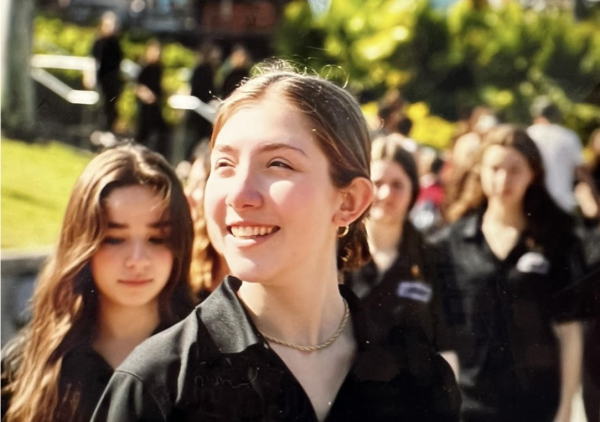All’s Fair in Love and War

Lovely War by Julie Berry.
May 15, 2022
“If music stops, and art ceases, and beauty fades, what have we then?” (Berry).
What is life without love? What is war without blood? What is music without soul? Told by Aphrodite, Julie Berry’s Lovely War, a romantic historical fiction novel, explores the impact of love, war, and music on four young lovers during World War I: Hazel Windicott, a British pianist; James Alderidge, an aspiring architect; Aubrey Edwards, an African American ragtime genius; and Colette Fournier, a Belgian refugee and enchanting chanteuse. With the War to End All Wars in full swing, the paths of Hazel and James cross at a London party, sparking a love story for the ages. Their budding romance is quickly interrupted when James is shipped off to fight in the trenches. Simultaneously, Aubrey, a soldier in the 15th New York Infantry, finds himself dragged away from his Harlem home to fight abroad. Charismatic and passionate, his life changes at a YMCA relief hut when Colette saunters in, taking permanent residence in his heart. Wary of opening herself to others, Colette’s beauty and heavenly voice hide the scars of a grievous past, a dark tragedy inflicted by the Germans.
As the fates of these mortals become intertwined, Julie Berry’s unmatched ability to juxtapose the dark nature of war with the brilliance of young love creates an intricate narrative. Though a seemingly odd combination, these charming love stories do not dull the atrocities of war, nor do they lessen their impact. Instead, the undying love of the two couples only makes the war’s horrors infinitely more heartbreaking. Also known for All the Truth That’s in Me and The Passion of Dolssa, Berry’s innate aptitude for weaving stories in which love and war must learn to coexist is incredible to behold. As Sarah from Goodreads claims, “This book is narrated by Greek gods, but are we sure it isn’t written by one too? Lovely War feels as if it is on a plane higher than us mere mortals. Julie Berry, I’m not sure what magic you cast over me but please never stop” (Goodreads).
Ironically, the entire premise of Lovely War is based on infidelity. After Aphrodite is caught by her husband Hephaestus in the midst of an affair with Ares, the site of their indiscretion, a 1940s Manhattan hotel room, serves as a courtroom. Desperate to avoid a hearing on Mount Olympus, Aphrodite recounts the tragically beautiful tale of Hazel, James, Aubrey, and Colette to her jealous husband, calling upon Ares, Apollo, and Hades to give testimony. Each immortal provides a unique perspective: the God of War brutal and blunt, the God of Art conceited and amusing, the God of Death somber and surprisingly gentle, the God of Love tender and sentimental. Aphrodite’s unexpected, yet clearly desperate, desire to be truly seen and appreciated by her fellow deities is tangible, expertly woven into her account alongside her husband’s raw hurt hidden beneath his fiery indignance.
Alternating between World War I and World War II, Berry eloquently captures the continuity of violence, the all-too human tendency to shed blood for the sake of blood. Yet, Aphrodite’s yearning to be human – to live, love, and die as mortals do – suggests humanity may still hold out hope for redemption. Humans are messy creatures, capable of murderous intentions, cruel designs, and brutal conduct, but they are also quite extraordinary in their resilence and desire. Love is the chain linking humankind, preventing our tenuously bound society from falling apart. Love is compassion, friendship, kind words, and soft touch. Love is a sweet melody, a rich painting, a delicate drawing, and a poetic letter. Love, despite its heartaches, is humanity’s savior.
Captivating for fans of historical fiction, romance, and Greek mythology, Lovely War exhibits the strength of friendship, the grim truth of prejudice, the grievous impact of war, and the redeeming nature of love. According to Ramapo Junior Deniz, “Julie Berry always writes such intriguing novels, and, in combining history, romance, and mythology, I’m sure Lovely War will be no different. I can’t wait to read it!” In essence, Lovely War is a tale of hope, a tribute to life itself which will keep readers enthralled until the very end.







